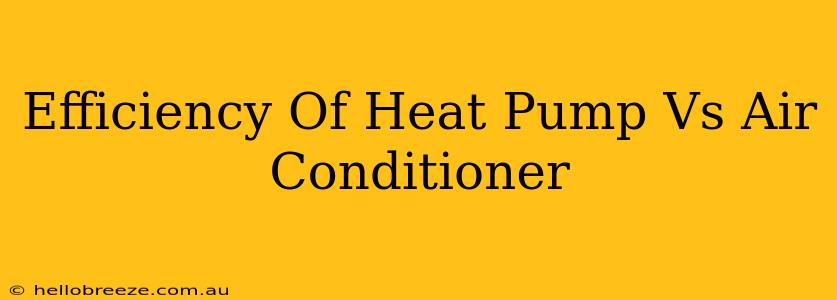Choosing between a heat pump and an air conditioner often leaves homeowners feeling perplexed. Both systems offer climate control, but their operational principles and efficiency levels differ significantly. This detailed comparison will illuminate the key distinctions, helping you make an informed decision based on your specific needs and climate.
Understanding Heat Pumps and Air Conditioners
Before diving into efficiency, let's clarify the core functionality of each system:
Air Conditioners: Cooling Only
Air conditioners operate on a simple principle: they absorb heat from indoor air and release it outdoors. This process relies on a refrigerant that undergoes a phase change, cooling the air within your home. Air conditioners are exclusively designed for cooling and lack the capacity to provide heating.
Heat Pumps: Heating and Cooling
Heat pumps are far more versatile. They function similarly to air conditioners during cooling mode, absorbing heat from inside and releasing it outside. However, they also possess the remarkable ability to reverse this process. During heating mode, a heat pump extracts heat from the outside air (even in relatively cold temperatures) and transfers it indoors, providing warmth.
Efficiency Showdown: SEER and HSPF Ratings
The efficiency of both systems is measured using different metrics:
SEER Rating (Seasonal Energy Efficiency Ratio)
SEER rating quantifies the cooling efficiency of air conditioners and heat pumps in cooling mode. A higher SEER rating indicates greater efficiency. Currently, minimum SEER ratings are regulated by law, with higher ratings reflecting superior energy savings.
HSPF Rating (Heating Seasonal Performance Factor)
HSPF rating specifically measures the heating efficiency of heat pumps. Again, a higher HSPF rating translates to greater efficiency and lower energy bills. This metric is not applicable to air conditioners, as they don't provide heating.
Key takeaway: While both systems have efficiency ratings, only heat pumps boast both SEER (for cooling) and HSPF (for heating) ratings.
Heat Pump Efficiency Advantages
Heat pumps, particularly those with high SEER and HSPF ratings, present considerable efficiency benefits over air conditioners, especially when considering both heating and cooling needs:
- Lower energy consumption: Heat pumps often consume less energy than traditional heating systems (like furnaces) for winter warming and significantly less than resistive electric heating.
- Dual functionality: This eliminates the need for separate heating and cooling systems, simplifying installation and maintenance.
- Environmental friendliness: Because they use less energy, heat pumps have a smaller carbon footprint.
- Cost savings: Lower energy usage translates to substantial long-term savings on utility bills.
When Air Conditioners Might Be Preferable
Despite the advantages of heat pumps, there are situations where an air conditioner may be a more suitable choice:
- Extremely cold climates: In areas with prolonged periods of extremely low temperatures, heat pumps may struggle to provide adequate heating, necessitating supplemental heating systems.
- Budget constraints: The upfront cost of a heat pump is typically higher than that of an air conditioner.
- Existing heating system: If you already have a reliable and efficient heating system (e.g., a gas furnace), adding an air conditioner might be the more cost-effective solution.
Choosing the Right System: Climate and Needs Matter Most
The optimal choice between a heat pump and an air conditioner depends largely on your specific climate and heating/cooling needs. Consider these factors:
- Your geographic location: Heat pumps are most efficient in milder climates. In extremely cold regions, their effectiveness might be limited.
- Your home's insulation: Well-insulated homes benefit significantly from heat pumps as they require less energy to maintain a comfortable temperature.
- Your budget: Factor in both the initial investment and potential long-term energy savings.
In conclusion: Heat pumps offer superior overall efficiency, especially in milder climates, providing both heating and cooling with lower energy consumption. However, air conditioners remain a viable option for specific situations, primarily in extremely cold climates or when budget is a major concern. A thorough assessment of your individual needs and climate is crucial for making the best decision.

